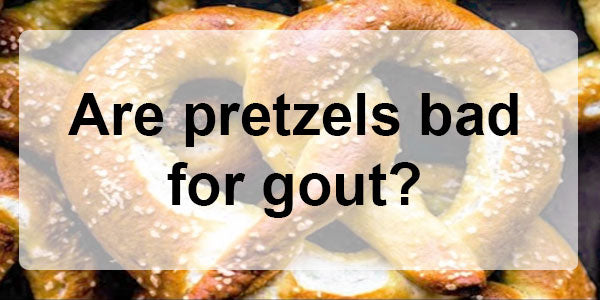Gout is a common inflammatory form of arthritis that affects the joints, especially in the feet. The condition is more common in men than in women and prevalence increases with age. Many people with gout will recognise the role that some foods play in triggering gout attacks - particularly rich foods; after all, it isn't called the disease of Kings for nothing! This may lead you to wonder whether your favourite snacks could be contributing to your gout attacks. For example, are pretzels bad for gout?
How do certain foods affect gout?
Gout has long been associated with a rich diet - but this isn't the whole story. We now know that gout is caused by a build-up of uric acid in the blood. While the kidneys usually filter excess uric acid out of the body, when they are unable to do so, sharp uric acid crystals can begin to form in and around the joints. These crystals can cause significant pain in the affected areas which is often debilitating. Individuals with gout may be advised to change their diet or to add supplements to help break down excess uric acid.
The build-up of uric acid in gout is largely associated with purines - chemical compounds in many foods. Purines are found naturally in the cells of all living organisms (including humans!) and are essential for many biochemical processes. For this reason, it is impossible to completely eliminate them from our bodies; however, some people with gout, as well as those with other purine metabolism disorders, may be advised to switch to a low-purine diet.
But what about our favourite treat foods? Are they high in purines that could lead to an increased risk of a gout attack?
The main culprits in your diet
As we mentioned earlier, purines are found in all plants, animals, and other living things. However, some foods are particularly high in these compounds - and not all of them are expected. So, let's take a look at some of these high-purine foods:
Red Meats: This one may not come as a surprise. In recent years, awareness of the health implications of eating too much red meat has increased. Meats such as beef, lamb, and pork contain higher levels of purines than white meats; however, despite being a lean, white meat, turkey is also high in purines. Gravy and meat sauces can also be rich in purines.
Game and Organ Meat: Meats such as liver, kidneys, and sweetbreads, as well as game meats such as venison and goose also contain high purine levels. For this reason, it is best to only enjoy these foods on special occasions.
Some Seafood: It may also come as a surprise to learn that certain seafood, such as scallops, muscles, tuna, and even haddock also contain high purine levels.
Sugar: Sugar, which is usually around half fructose, breaks down into uric acid - the main culprit in gout. Drinks and foods that are high in sugar can therefore be a significant trigger for gout.
Yeast and yeast extract: Yeast - including brewer's yeast, nutritional yeast, and yeast supplements - can increase uric acid levels in the blood which may trigger gout flare-ups.
In contrast, foods that are believed to be low in purines and generally good for gout include cherries, coffee, and of course, water.
Are pretzels bad for gout?
So, now that we have covered the key culprits that may be triggering your gout symptoms, let's get to the crux of this article: Are pretzels bad for gout?
Pretzels are a type of bread made from wheat or rye flour. From its origin in Germany and France, the recognisable shape and versatility of the pretzel have helped to make it a staple all over the world. From large, soft and doughy to small, hard and covered in toppings, pretzels have become a favourite in many forms; however, being often made with enriched flour and filled with ingredients such as salt, sugar, and yeast, pretzels can hardly be called a healthy snack.
Aside from offering very little nutritional value, these ingredients may also make pretzels a no-go if you suffer from gout.
Generally speaking, soft pretzels - which are more in keeping with the original pretzels from Europe - are lower in calories than their harder counterparts. Pretzels are also very high in carbohydrates which may contribute to a rise in uric acid. It is often recommended that individuals with gout eat less refined carbohydrates, such as white bread; however, wholegrain products may be a better option.
Conclusions
To date, there are no studies that have directly assessed specifically whether pretzels are bad for gout. However, these bready snacks contain some of the ingredients that are commonly advisable to avoid if you suffer from gout, including sugar and yeast.
Furthermore, pretzels are often served with toppings such as chocolate or high-sodium coatings which make them an unhealthy option. For this reason, it is best to treat yourself to pretzels only on special occasions and in moderation, particularly if you have gout.
If you are concerned about potential triggers of gout symptoms, you may wish to speak with your doctor or a professional dietitian. They will be able to give you more detailed advice about any foods you should be avoiding.






